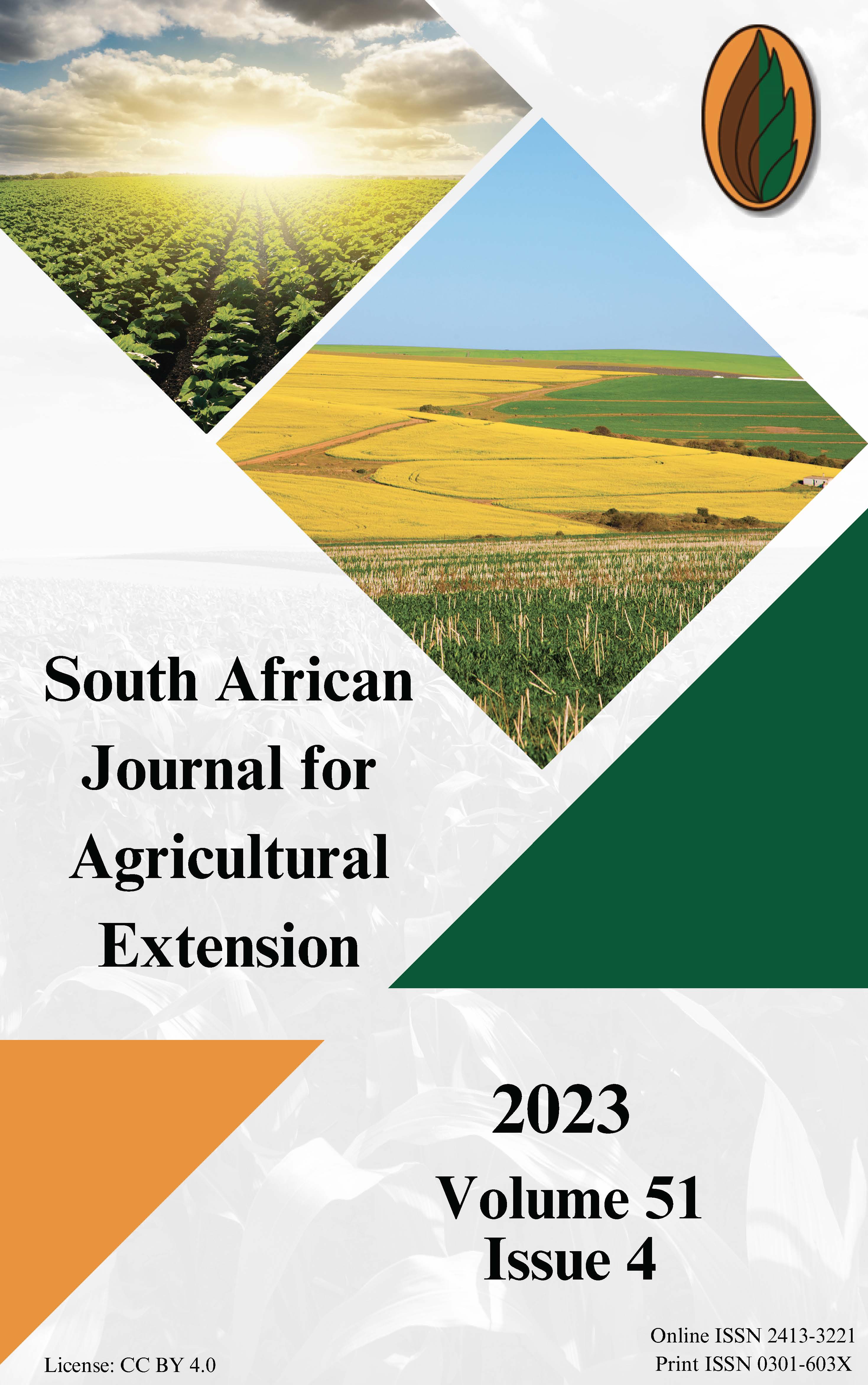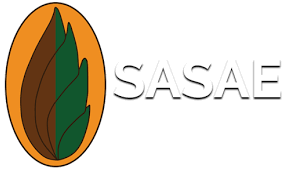Effects of Goat Breed Improvement Program on Climate Change Resilience Among Smallholder Farmers in Semi-Arid Zimbabwe
DOI:
https://doi.org/10.17159/2413-3221/2023/v51n4a13093Keywords:
Goat Breed Improvement Programme, Climate change, Livelihood, Resilience, Small goat farmersAbstract
The goat breeding improvement program played a crucial role in addressing the challenges of climate change vulnerability among the smallholder farmers of climate change-vulnerable communities in Gokwe North district, Zimbabwe. Using cross-sectional data from 217 small-scale farmers in four randomly selected wards in the Gokwe North district of Zimbabwe, the study examined the effect of the program on households’ climate change adaptation capabilities using proxy variables including food security, asset acquisition, access to affordable credit, and enhanced business management competencies. Primary data were collected using questionnaires. Results show that there were gains in credit access, asset base improvements, food security and income. The evaluation established an excellent potential for sustainability or continued flow of benefits beyond the program’s lifetime, given the institutional capacity building implemented under the program. There were impacts regarding the program accruing positive changes in well-being, improved livelihoods, and community adaptation even in the face of climate change and an ever-changing economic policy environment. Gokwe North District can be further transformed, given the level of commercialisation of the goat project among the participating members of the community, if extension support is provided in a way that suits the farmers’ capacities to learn.
Downloads
References
ASSAN, N. & SIBANDA, M., 2014. Goat production in the smallholder section in the Matobo district in semi-arid areas of Zimbabwe. Agr. Adv., 3(8): 218-228.
BOND, R. & MACHEN, J., 2001. Performance of meat goat kids sired by Boer bucks. Texas Agri. Ext. Service.
CHAGUTAR, T., 2010. From big to small: The significance of smallholder farms in the global food system. Heinrich Boell Stiftung, Cape Town: Zimbabwe Country Report.
CHISANGO, F., MOYO, W., GASVA, D. & MULEYA, L., 2015. Impact of new rural goat marketing structures through auction sales pens to the livelihood of smallholder producers under the ongoing advocacy for small livestock value addition: A panacea for rural poverty eradication in Zimbabwe. Int. J. Hum. Soc. Stud., 3(2).
CRESWELL, J., 2012. Designing and conducting mixed methods research. Sage Publications
FANZO, J., 2017. From big to small: The significance of smallholder farms in the global food system. Johns Hopkins University.
Food and Agriculture Organization of the United Nations (FAO)., 2007. Adaptation to climate change in agriculture, forestry, and fisheries: Perspective, framework and priorities. Rome: FAO.
Food and Agriculture Organization of the United Nations (FAO)., 2023. The state of food security and nutrition in the world 2023 (SOFI). Available from https://www.fao.org/3/cc3017en/cc3017en.pdf.
FEWS NET., 2023. Zimbabwe food security outlook update, February to September 2023. Available from https://reliefweb.int/report/zimbabwe/zimbabwe-food-security-outlook-update-february-september-2023
FRISCHEN, J., MEZA, I., RUPP, D. & WIETLER, K., 2020. Drought risk to agricultural systems in Zimbabwe: A Spatial analysis of hazard, exposure, and vulnerability. Sustainability, 12(3): 752-761.
MABURUTSE, B.E., MUTIBVU, T., MBIRIRI, D.T. & KASHANGURA, M., 2012. Communal livestock production in Simbe, Gokwe south district of Zimbabwe. OJAFR., 2: 351-360.
MADZAMUSE, M., 2010. Climate Governments in Africa: Adaptation strategies and institutions. A synthesis report prepared for the Heinrich Boll Foundation.
MARKOS, T., 2006. Productivity and Health of indigenous sheep breeds and crossbreds in the Central Ethiopian Highlands. Faculty of Medicine and Animal Science Department.
MANIRAKIZA, J., HATUNGUMUKAMA, G., BESBES, B. & DETILLEUX, J., 2020. Characteristics of smallholders’ goat production systems and effect of Boer crossbreeding on body measurements of goats in Burundi. Pastoralism, 10(1): 1-11.
MONAU, P., RAPHAKA, K., CHIMBODZA, P.I. & GONDWE, T., 2020. Sustainable Utilisation of Indigenous Goats in Southern Africa. Diversity., 12(1): 20.
MUSAKWA, W., MPOFU, E. & NYATHI, N.A., 2020. Local community perceptions on landscape change, ecosystem services, climate change, and livelihoods in Gonarezhou National Park, Zimbabwe. Sustainability., 12(11): 4610
NDLOVU, C., MAYIMELE, R., WUTETE, O. & NDUDZO, A., 2020. Breeding of goats: An indigenous approach to enhancing opportunities for smallholder farmers in Inyathi, Zimbabwe. Int. J. Livest. Prod., 11(3): 91-101.
OGANDA, M.J., RAO, E.J., RADENY, M., RECHA, J.W. & SOLOMON, D., 2020. Climate-smart agriculture, household income and asset accumulation among smallholder farmers in the Nyando basin of Kenya. World Dev. Perspect., 18: 100203.
ROOYEN, A.V. & HOMANN-KEE TUI, S., 2009. Promoting goat markets and technology development in semi-arid Zimbabwe for food security and income growth. Trop. Subtrop. Agroecosystems., 11(1): 1-5
TIRIVANGASI, H.M., 2019. Challenges faced by rural people in mitigating the effects of climate change in the Mazungunye communal lands, Zimbabwe. Jamba: Journal of Disaster Risk Studies, 11(1): a596.
UNDP., 2023. Zimbabwe launched a climate change gender action plan. Available from https://www.undp.org/zimbabwe/news/zimbabwe-launched-climate-change-gender-action-plan
UNEP., 2023. Climate change 2023: Synthesis report. Available from https://www.unep.org/resources/report/climate-change-2023-synthesis-report.
UNFCCC., 2022. Zimbabwe’s initial adaptation communication to the United Nations Framework Convention on Climate Change. Available from https://unfccc.int/sites/default/files/ACR/2022-10/zimbabwe-adcom-2022_final.pdf
ZUZA, E.J., MASEYK, K., BHAGWAT, S., EMMOT, A, RAWES, W. & ARAYA, Y.N., 2021. Focusing on what, where, how much is produced and major constraints. Agriculture., 11(52): 1-19.
Downloads
Published
Issue
Section
License
Copyright (c) 2023 W. Bvirwa, J.P. Musara, G.B. Nyamushamba

This work is licensed under a Creative Commons Attribution 4.0 International License.








.png)